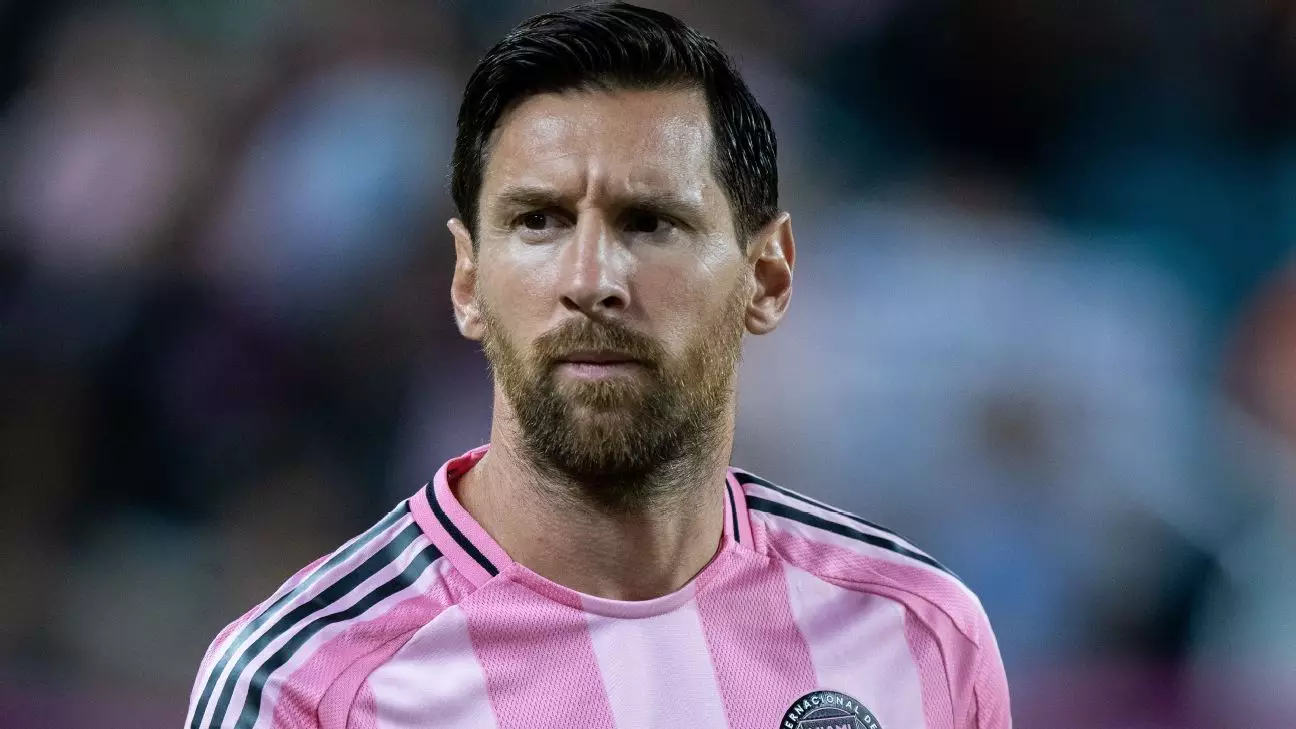Lionel Messi’s future remains one of the most tantalizing mysteries in the world of football. As his contract with Inter Miami approaches its end, the legendary Argentine has garnered interest from multiple fronts. Notably, Al Ahli, a prominent club in Saudi Arabia’s burgeoning Pro League, is eager to add Messi to their roster and reportedly willing to go to extraordinary lengths to secure his signature. This potential move signals a shift in the football landscape, where Middle Eastern clubs are no longer content with being mere stage hosts but aim to attract the world’s biggest stars.
While Al Ahli’s overtures highlight their ambitions, Messi’s commitments in Miami complicate matters. He remains in negotiations with Inter Miami, indicating a desire to prolong his North American chapter. Nevertheless, the Saudi club’s aggressive approach underscores a broader trend—rich, emerging football markets seeking to leverage the star power of globally recognized icons for both sporting success and commercial influence.
For Messi, this chapter is less clear-cut. The allure of a lucrative contract in a region eager to make a statement competes against his established connection with Miami. The question is whether he views this as a final payday or as a strategic move to expand his global influence—potentially as both a player and an ambassador for the Saudi tourism push. The decision will inevitably set a precedent for superstar transfers into less traditional football powerhouses, challenging the dominance of European leagues and North American circuits.
European Clubs Realign, Targeting Smart Transfers Over Flashy Signings
While rumors swirl around Messi’s potential move, European clubs continue to shape their summer strategies with calculated precision. Barcelona’s renewed interest in Manchester United’s Marcus Rashford exemplifies this approach. Having long coveted a versatile attacker, Barcelona faces the reality that their initial plans—like snagging Liverpool’s Luis Díaz—are now less feasible. The fading prospects of Díaz and the long-term extension for Nico Williams at Athletic Bilbao have nudged Barcelona to consider Rashford, a player whose profile fits their attacking philosophy and strategic rebuild.
This shift underscores a broader narrative—elite clubs favor strategic acquisitions over impulse signings. Rashford’s contract at United is strong until 2028, meaning his departure will likely involve a significant transfer fee, but his proven goal-scoring ability makes him a valuable asset. For Barcelona, this move signals a proactive effort to bolster their squad with proven Premier League talent, even if it means paying a premium.
Meanwhile, the ongoing transfer activity shows a pattern of clubs prioritizing value and long-term fit, often opting for seasoned internationals like Rashford over youthful prospects or expensive marquee signings. The trend indicates a maturing football economy where prudent, well-analyzed investments may yield more sustainable success than the gamble on high-profile flashy signings that often carry inflated price tags.
Undercurrents of Market Realities: Emerging Players and Strategic Departures
Amidst the high-profile rumors, the market reveals a focus on emerging talent and strategic squad restructuring. Tottenham is eyeing Koni De Winter from Genoa, signaling a shift to younger, more versatile defenders capable of fitting into a demanding Premier League environment. Similarly, Crystal Palace is close to finalizing Borna Sosa’s switch from Ajax, adding experience and quality on the left flank. These signings reflect a philosophy rooted in building for the future while maintaining immediate competitiveness.
On the international front, the transfer activity hints at a strategic realignment of squad roles. For instance, Newcastle United’s anticipated departure of Callum Wilson marks a generational shift—bringing in fresh attacking options or focusing on developing younger players. Likewise, veteran players like Wojciech Szczęsny securing new contracts combine experience with stability, a tactic that many clubs are using to balance youth with seasoned leadership.
Moreover, clubs across Europe are orchestrating complex negotiations for versatile internationals—such as Napoli’s plans for PSV’s Noa Lang or Fenerbahçe’s interest in Alexis Sánchez—highlighting a market that values multi-dimensional players capable of adapting to various tactical systems. The juggling act involves balancing financial constraints with the desire to strengthen competitive squads, often leading to creative loan arrangements and strategic signings.
The Big Picture: Power Dynamics and Global Ambitions
The current transfer window signals more than just player movement; it reflects shifting power dynamics within global football. Middle Eastern clubs, exemplified by Al Ahli and Al Hilal, are no longer passive spectators but active contenders seeking marquee signings. Their willingness to pay premium fees and offer lucrative contracts is a strategic move to position themselves as serious competitors on the world stage.
Meanwhile, traditional European giants are engaging in calculated negotiations, prioritizing long-term stability and squad harmony over short-lived spectacle. The signing of young, promising players from leagues like Serie A, La Liga, and beyond indicates an overarching desire to foster homegrown talent and develop sustainable team identities.
The landscape is also affected by the economic realities of the sport, with clubs like Nottingham Forest and Lecce making strategic signings to bolster their squads without overspending. Their approach contrasts sharply with the blockbuster transfers of the past, emphasizing a maturation of transfer strategies that value long-term growth over fleeting fame.
In this rapidly evolving environment, only clubs with strategic vision and financial prudence will emerge with sustained success. The ambitious chase for star power coexists with a shift towards building balanced, adaptable squads—heralding a new era in global football where ingenuity often outweighs the allure of marquee names.

Leave a Reply